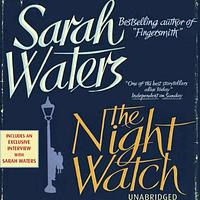Take a photo of a barcode or cover
I feel like this book has been on my to be read shelf forever, so maybe I had higher expectations than I should have. It was definitely not my favorite Sarah Waters novel, perhaps because I really didn't like several of the main characters - Helen in particular. What I did like, though at first I wasn't sure I would, was the format of the novel, moving backwards through time to show you how they got to where they were. Of course, being set during World War II heightened the desperate feeling of the whole thing, compounded by the personal crises suffered by each character, which made it difficult to enjoy the story but very easy to sympathize.
lovely atmosphere and characterisations - the timeline was a bit of a novelty and it worked. i have a bias towards WW2 stories and short stories in general so this was a bit hard to rate objectively. problems were that i could not empathise with some characters and as with some sarah waters stuff it did appear to be over-written. the parts that mattered were well-written. also another problem is that my attention span can only grasp so much so perhaps i should stick to books with one single narrative rather than so many
medium-paced
Plot or Character Driven:
Character
Strong character development:
Yes
Loveable characters:
Complicated
Diverse cast of characters:
Yes
Flaws of characters a main focus:
Yes
dark
emotional
sad
medium-paced
Plot or Character Driven:
Character
Strong character development:
Yes
Loveable characters:
Yes
Diverse cast of characters:
Yes
Flaws of characters a main focus:
No
dark
slow-paced
Plot or Character Driven:
Character
Strong character development:
Complicated
Loveable characters:
No
Diverse cast of characters:
Complicated
Flaws of characters a main focus:
Complicated
One major reason I love Sarah Waters' books is that she paints such a rich history for women. I love how she features lesbians and lesbian life throughout history. There is much written about men and gay men (natch, why shouldn't men take over literature too?) and yet, not a lot of quality, compelling, raw, devastating and accurate prose written about women, women who loved other women. It's so important that we have Sarah Waters.
The Night Watch is my favourite Waters novel. It's perfect. Everything about the way she constructed the book, everything about the editing of it, the descriptions of World War II and its aftermath (gah, I can't get over how well she writes period dramas, without delving into cliched tropes), the characters, the relationships. It's perfection, beginning to end.
And oh, how I adored the people we met.
Gentle, vicious, frustrating, frustrated, impulsive, silly Helen.

Noble, complicated, intelligent, miserable Kay.

Gorgeous, devastating, intimidating, wealthy Julia.

(I can't believe this is the only picture I could find of such an important character!)
Irrepressible, disappointed, beautiful, melancholy Viv.

And Duncan. I won't find a picture of him, but Duncan - more than anyone - was stranded, suffocated, stuck-in-place.
Interestingly, Waters chose to begin this novel at the end, and go back in time to find out how our characters came to be where and who they are. It's a frustrating tactic (because in a way, we'll know all we know by the first act) but an effective one, as Waters peels the onion slowly and lyrically.
She brings wartime London alive with precision and grace, and her characters stumble through their lives, never quite making the right decisions, never quite realizing where they will end up. This is especially true when it comes to Helen, who
The relationships are so skillfully woven here, and the vividness of certain scenes still stick in my mind (Viv's
By the end, you might feel a little cheated - I did when I first read it- but I now choose to marvel at how Waters unraveled their stories and how she showed what was truly vital for us to know - after all, hindsight is 20/20, and these characters never knew and might never have dreamt, where they'd be after the war.
Where they would be after those rash decisions, when it seemed as though the world would end - but then, it didn't.

The Night Watch is my favourite Waters novel. It's perfect. Everything about the way she constructed the book, everything about the editing of it, the descriptions of World War II and its aftermath (gah, I can't get over how well she writes period dramas, without delving into cliched tropes), the characters, the relationships. It's perfection, beginning to end.
And oh, how I adored the people we met.
Gentle, vicious, frustrating, frustrated, impulsive, silly Helen.

Noble, complicated, intelligent, miserable Kay.

Gorgeous, devastating, intimidating, wealthy Julia.

(I can't believe this is the only picture I could find of such an important character!)
Irrepressible, disappointed, beautiful, melancholy Viv.

And Duncan. I won't find a picture of him, but Duncan - more than anyone - was stranded, suffocated, stuck-in-place.
Interestingly, Waters chose to begin this novel at the end, and go back in time to find out how our characters came to be where and who they are. It's a frustrating tactic (because in a way, we'll know all we know by the first act) but an effective one, as Waters peels the onion slowly and lyrically.
She brings wartime London alive with precision and grace, and her characters stumble through their lives, never quite making the right decisions, never quite realizing where they will end up. This is especially true when it comes to Helen, who
Spoiler
in the beginning of the book, is in a relationship with Julia and riddled with jealousy over any woman that Julia meets. We come to realize that Helen left Kay for Julia, and Helen's own guilt has manifested into a poisonous creature she cannot control. In the end, she is left grieving for Kay and what might have been - though she cannot escape her love for Julia, and equally, she cannot escape that Julia no longer loves her).The relationships are so skillfully woven here, and the vividness of certain scenes still stick in my mind (Viv's
Spoiler
abortion, with the Bull, still makes me shudder. Kay's wish that she could marry Helen and look after her - so heartbreakingly sad. Duncan's nighttime visits with Mr. Mundy. The dank, depressing, squalid prison. Kay's friend Mickey's boat, drinking gin with lime. Kay's feeling of loss after the war is over and her job, her purpose, is done. The utter bonedeep terror of the bomb drops, and the exhiliration of that first illicit sex between Julia and Helen.By the end, you might feel a little cheated - I did when I first read it- but I now choose to marvel at how Waters unraveled their stories and how she showed what was truly vital for us to know - after all, hindsight is 20/20, and these characters never knew and might never have dreamt, where they'd be after the war.
Where they would be after those rash decisions, when it seemed as though the world would end - but then, it didn't.

dark
hopeful
medium-paced
Plot or Character Driven:
A mix
Loveable characters:
Complicated
Diverse cast of characters:
No
Flaws of characters a main focus:
Yes
challenging
dark
emotional
medium-paced
Plot or Character Driven:
A mix
Strong character development:
Yes
Loveable characters:
Complicated
Diverse cast of characters:
Yes
Flaws of characters a main focus:
Yes
emotional
informative
reflective
tense
fast-paced
Plot or Character Driven:
A mix
Strong character development:
Yes
Loveable characters:
Yes
Diverse cast of characters:
No
Flaws of characters a main focus:
Yes


